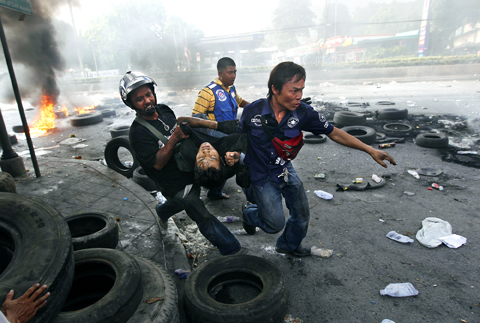Smoke billows from burning tires. Bangkok’s biggest streets, normally clogged by traffic, are empty and guarded by troops backed by razorwire. Troops fire on anti-government protesters, playing cat and mouse.
A cacophony of ambulance sirens, gunshots and thunderous explosions echo down streets lined with office towers, malls and hotels, as troops scramble for cover behind concrete pillars.
Welcome to Bangkok, a tourist hot spot known for its cultural attractions, racy nightclubs and — now — scenes of anarchy more reminiscent of an apocalyptic Hollywood movie.

PHOTO: REUTERS
Thousands of armed troops struggled to throw a security cordon around Bangkok’s commercial center yesterday, battling protesters armed with petrol bombs, rocks and, according to the government, possibly guns and grenades.
Authorities put up banners in parts of the business district warning people they were entering a “live fire zone.”
Medical rescue workers scurried into the streets to evacuate the wounded and the dead, recorded by television and photojournalists. One medical rescue worker was shot and feared dead. At least three journalists were among the 161 wounded since Thursday night in the mayhem that has killed 17.
The violence showed no sign of abating.
“It’s pretty frightening what’s going on. I’m surprised the lengths both sides are willing to go,” said Frederick Dierckxsens, a Belgian businessman who lives in central Bangkok. “It’s gone on far too long and it’s getting worse.”
Thousands of red-shirted demonstrators, many of them women and children, rallied defiantly in their encampment fortified with walls of tires and bamboo poles topped with razor wires. They seemed unperturbed over the possibility troops could invade the bastion they have occupied the past six weeks.
“Let them come,” said one Red Shirt named Piahist, brandishing a bamboo spear.
‘HAPPY YOU’RE LEAVING’
Power and cellphone signals were intermittent in parts of the city. Near-empty hotels once eager to lure wealthy guests were now trying to keep them away.
“I’m so happy you’re leaving,” the general manager of the Metropolitan Hotel told one guest checking out after troops and soldiers faced off the night before on the street outside. “We’ve been e-mailing anyone who has booked rooms here telling them not to come.”
In a televised address on Friday, Thailand’s government spokesman said the situation would return to normal “in a few days,” but residents were not as confident.
“My ears are ringing with all the shooting last night,” said Ratana Veerasawat, a grocery store owner north of the protest site. “It’s just awful and getting worse. Best to leave now.”
People forced to walk home at night in the urban war zone hear soldiers screaming and firing warning shots at protesters, punctuated by the occasional blast of grenades, which the military says some Red Shirts are throwing.
In a message from New York, UN Secretary-General Ban Ki-moon appealed to both sides to “do all within their power to avoid further violence and loss of life.”

CHIP WAR: The new restrictions are expected to cut off China’s access to Taiwan’s technologies, materials and equipment essential to building AI semiconductors Taiwan has blacklisted Huawei Technologies Co (華為) and Semiconductor Manufacturing International Corp (SMIC, 中芯), dealing another major blow to the two companies spearheading China’s efforts to develop cutting-edge artificial intelligence (AI) chip technologies. The Ministry of Economic Affairs’ International Trade Administration has included Huawei, SMIC and several of their subsidiaries in an update of its so-called strategic high-tech commodities entity list, the latest version on its Web site showed on Saturday. It did not publicly announce the change. Other entities on the list include organizations such as the Taliban and al-Qaeda, as well as companies in China, Iran and elsewhere. Local companies need

CRITICISM: It is generally accepted that the Straits Forum is a CCP ‘united front’ platform, and anyone attending should maintain Taiwan’s dignity, the council said The Mainland Affairs Council (MAC) yesterday said it deeply regrets that former president Ma Ying-jeou (馬英九) echoed the Chinese Communist Party’s (CCP) “one China” principle and “united front” tactics by telling the Straits Forum that Taiwanese yearn for both sides of the Taiwan Strait to move toward “peace” and “integration.” The 17th annual Straits Forum yesterday opened in Xiamen, China, and while the Chinese Nationalist Party’s (KMT) local government heads were absent for the first time in 17 years, Ma attended the forum as “former KMT chairperson” and met with Chinese People’s Political Consultative Conference Chairman Wang Huning (王滬寧). Wang

CROSS-STRAIT: The MAC said it barred the Chinese officials from attending an event, because they failed to provide guarantees that Taiwan would be treated with respect The Mainland Affairs Council (MAC) on Friday night defended its decision to bar Chinese officials and tourism representatives from attending a tourism event in Taipei next month, citing the unsafe conditions for Taiwanese in China. The Taipei International Summer Travel Expo, organized by the Taiwan Tourism Exchange Association, is to run from July 18 to 21. China’s Taiwan Affairs Office spokeswoman Zhu Fenglian (朱鳳蓮) on Friday said that representatives from China’s travel industry were excluded from the expo. The Democratic Progressive Party government is obstructing cross-strait tourism exchange in a vain attempt to ignore the mainstream support for peaceful development

ELITE UNIT: President William Lai yesterday praised the National Police Agency’s Special Operations Group after watching it go through assault training and hostage rescue drills The US Navy regularly conducts global war games to develop deterrence strategies against a potential Chinese invasion of Taiwan, aimed at making the nation “a very difficult target to take,” US Acting Chief of Naval Operations James Kilby said on Wednesday. Testifying before the US House of Representatives Armed Services Committee, Kilby said the navy has studied the issue extensively, including routine simulations at the Naval War College. The navy is focused on five key areas: long-range strike capabilities; countering China’s command, control, communications, computers, cyber, intelligence, surveillance, reconnaissance and targeting; terminal ship defense; contested logistics; and nontraditional maritime denial tactics, Kilby